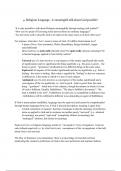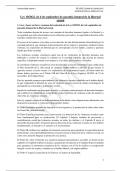Summary
Summary Religious Language A Level RS Notes
- Module
- Unit 4 - Religious language
- Institution
- PEARSON (PEARSON)
Detailed notes on section 4 of the Pearson Edexcel A Level RS Specification (Paper 1 - Philosophy) Includes: Aquinas and analogy (Predicative; Proportional) Paul Tillich on Symbolism Rudolf Otto on numinosity Logical Positivism Ayer's Verification Principle Flew's Falsification Principle ...
[Show more]




